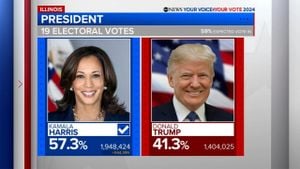The International Criminal Court (ICC) has made headlines recently with the issuance of arrest warrants for notable Israeli leaders, including Prime Minister Benjamin Netanyahu and former Defense Minister Yoav Gallant. This decision raises significant political and legal questions, particularly as Israel continues its controversial military actions in Gaza. The court’s findings are particularly alarming for those closely following the dynamics of the Israeli-Palestinian conflict.
On November 21, 2024, the ICC, based at The Hague, announced these warrants based on the belief there are substantial grounds to hold these leaders responsible for war crimes and crimes against humanity, particularly the allegations pointing to the use of starvation as a tactic against the Palestinian population. The warrants reflect serious charges, including murder and persecution.
The legal ramifications of these warrants extend not only within Israel but also across Europe, where solidarity with Israel is often tempered by commitments to international justice. European Union foreign policy chief Josep Borrell emphasized the importance of adhering to ICC mandates, stating unequivocally, "the ICC warrants should be respected and implemented." This stark statement places European nations at the crossroads of supporting Israel and adhering to international law.
Raji Sourani, director of the Gaza-based Palestinian Center for Human Rights (PCHR), described the warrants as a significant development, noting, "This decision sends a powerful message globally: no one escapes accountability for alleged war crimes, regardless of their position." Sourani's insights shed light on how these findings can impact the political calculus surrounding the conflict.
Interestingly, the ICC has faced considerable challenges with enforcement. Despite the court's authority to prosecute substantial crimes, it lacks independent enforcement mechanisms. The success of such warrants, historically, relies on the willingness of member states to act upon them, leading to inconsistencies. Past examples, such as the ICC warrant for Sudan's Omar al-Bashir or Russian President Vladimir Putin's evasion of arrest, demonstrate this dilemma.
Despite these hurdles, the impact of the warrants could alter the diplomatic reactions to Israeli officials. Countries now face the complex decision of how to engage with Netanyahu and Gallant, especially during international travel. Already, there have been rumblings within U.S. political circles expressing discontent with the ICC's actions, as President Joe Biden and various lawmakers have criticized the court's jurisdiction. This has echoed the longstanding U.S. reluctance to recognize the ICC's authority, which dates back to its inception.
Critically, the warrants are not just about accountability; they signify much broader issues of international law and justice. They challenge the perceived impunity often associated with powerful states and their leaders. The ability of the ICC to function effectively relies on its recognition and support from member nations, all of whom have their own geopolitical interests at stake.
Some countries, particularly those aligned closely with the U.S., are ambivalent about the warrants. Senators like Lindsey Graham and Tom Cotton have made aggressive statements against foreign nations aiding the ICC, threatening economic repercussions if they comply with the court’s mandates. Cotton's reference to the Hague invasion act during these discussions highlights the contentious relationship between U.S. political figures and international legal frameworks.
The treatment of Hamas leaders is also part of this legal web. The ICC issued warrants for Hamas military commander Mohammed Deif, indicating the court's intent to apply its principles uniformly, even if the political winds may affect perceptions of justice.
Netanyahu himself has reportedly reached out to leaders like French President Emmanuel Macron, urging them to prevent the enforcement of these warrants. Macron’s response, indicating France’s commitment to international law, reiterates the fundamental conflict between political alliances and legal obligations at the international level.
Borrell’s statements signal significant pressure on EU nations to reckon with their stands on Israel’s military tactics and the broader implications for justice. Still, reactions vary widely. The announced warrants could complicate diplomacy and international efforts toward peace, drawing sharp responses from Israel and its allies.
Many experts suggest these developments could serve as both a deterrent and catalyst for human rights advocacy. To maintain momentum, Sourani and other human rights defenders stress the importance of public support for international accountability measures, which may amplify the ramifications of the ICC’s actions.
These arrests are not just judicial matters; they are intertwined with politics, sovereignty, and the persistent question of how international law applies to state leaders. Ensuring accountability requires more than legal frameworks; it demands political will and international cooperation. This multifaceted dilemma raises challenging questions about the efficacy and morality of international justice systems.
While the ICC's authority is often questioned, its decisions like these have the power to change narratives and bring long-standing issues to the forefront of global discussions about human rights, justice, and accountability. Yet, the real test lies not just in issuing warrants but whether international actors will heed the calls for compliance and justice.
The decision also reflects the resilience of legal frameworks against powerful regional actors. Sourani’s final thoughts resonate deeply with those who dare to believe justice can prevail: "We must not lose faith, as every step toward accountability reinforces the rule of law and affirms the principles of justice. Every action, no matter how small, is part of our collective struggle for human rights. We will continue to press for accountability, and the ICC's warrants are part of this long road."



